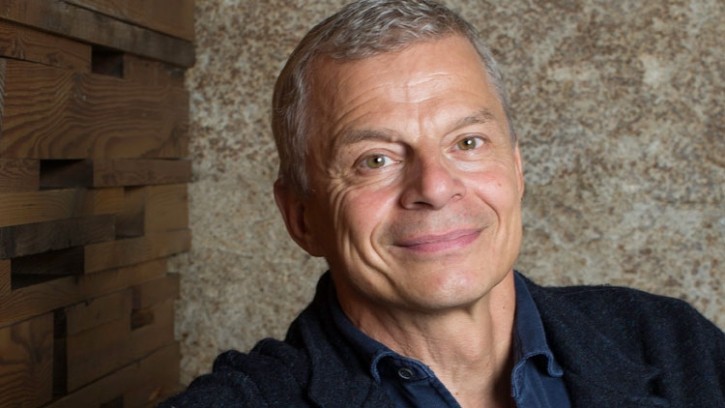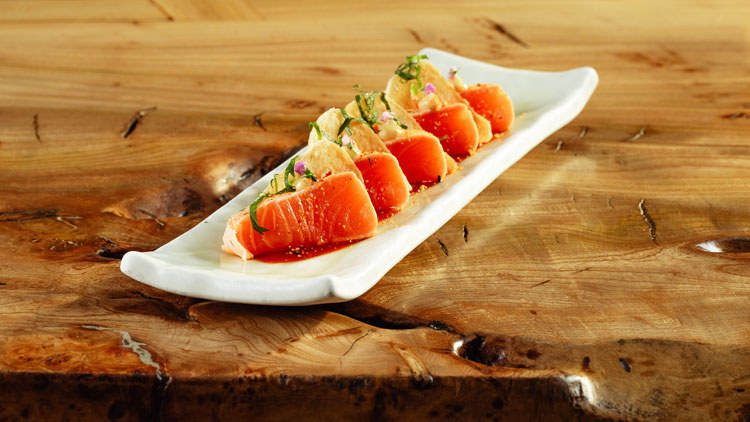Turning Japanese: Rainer Becker on two decades of ROKA

One has to hand it to Rainer Becker and his jet-setting Azumi group: for a 20-year-old restaurant ROKA Charlotte Street doesn’t look half bad.
“We have actually done very little to it over the years. The tables and chairs have been changed a few times but that’s about it. I still feel comfortable here and it remains very busy,” Becker says.
He’s not wrong. It’s 3.30pm on a Thursday and the dining room remains pretty much full of media-types casually dropping £100 plus on ROKA’s pretty ‘authentic but not traditional’ Japanese food.
While we are mainly here to talk about ROKA – which celebrates its 20th birthday this year – Fitzrovia isn’t quite where it all started for the German-born chef-turned-wildly-successful international restaurateur. Though it feels odd to describe it as such two decades and a dozen restaurants down the line, ROKA is technically a spin-off from his original Japanese restaurant concept Zuma, which opened in 2002 in Knightsbridge (see Timeline, below).
Both brands – which were among the first premium restaurants in the world to successfully pursue global expansion (following in the footsteps of Nobu) and inspired countless others to do the same – owe their existence to Becker’s time working in Tokyo as a high-flying young chef.
Lost in translation
“It’s funny because I did not initially want to go to Japan. I was executive chef at the Park Hyatt Sydney having a great time," recalls Becker, who was eventually persuaded to oversee the launch of Park Hyatt Tokyo’s five restaurants.
With the benefit of hindsight, he would have been a fool to pass such an opportunity up. Launched in 1994, the Park Hyatt Tokyo was the first Western-owned luxury hotel in Japan and made a big impact. It was also where Sofia Coppola’s cult movie Lost In Translation was filmed.
Just like the film’s two protagonists – who were memorably portrayed by Bill Murray and Scarlett Johansson – it took Becker a while to acclimatise to Japanese culture.
“I didn’t love Japanese food right away,” he admits. “In Australia, Asian flavours are very powerful but in Japan they are in general much more subtle. It took at least a couple of months until my palate adjusted to it.”
This experience of Japanese food being somewhat lost in translation continues to inform ROKA and Zuma’s culinary approach. While the food is relatively authentic, the taste profile has been adjusted to better suit the Western palate.
One of Becker’s biggest innovations was to dial up the brightness and contrast by 20% or so hitting diners with more seasoning and umami. “I remember thinking as we were opening Zuma that only a handful of our customers would be Japanese, so it didn’t make sense to cook for them,” he says.
The drunken scrap that helped Azumi go global
Timeline
2001: Rainer Becker and Arjun Waney co-found Azumi Limited
2002: Zuma launches in Knightsbridge
2004: ROKA launches in Fitzrovia
2007: Azumi makes its international debut with a Zuma in Hong Kong
2008: International expansion ramps up with Zumas launching in Dubai and Istanbul
2009: A second ROKA launches in Canary Wharf
2013: Oblix opens on the 32nd floor of The Shard, London
2014: Two further London ROKAs open in Mayfair and Covent Garden
2018: Becker launches the more casual INKO NITO in Soho
2020: ROKA heads to Dubai for its first overseas opening
2022: Zuma marks 20 years with launches in Mykonos, Ibiza and Sardinia, bringing its total number of restaurants to 20
2024: ROKA celebrates its 20th birthday
Located on a backstreet between Harrods and Hyde Park, Zuma was an instant hit drawing an A-list crowd from the off. Its status as a celeb magnet was cemented when a Gladiator-era Russell Crowe got in a fight that ended up getting broken up Ross Kemp.
“That really helped us get our name out around the world,” chuckles Becker who, together with his business partner Arjun Waney, has opened 24 Zumas and 14 ROKAs to date making it one of the globe’s biggest players in the premium restaurant space (Azumi has a few other restaurants including London one-offs Oblix and INKO NITO). Famously Waney – who is also one of the key people behind Le Petite Maison and Coya – backed Becker because he was sick of not being able to get a table at Nobu.
While ROKA was to some extent designed not to tread on Zuma’s toes there is significant menu crossover, with both brands majoring on robata-cooked dishes, sushi, sashimi, and tempura. According to Becker, it’s more about the difference in feel with ROKA conceived as a less exclusive, more neighbourhood-y counterpoint to its unashamedly glam older sibling (the brand’s name is derived from the Japanese words ‘ro’, meaning to share with friends, and ‘ka’, which means heat and energy).
“The central idea of ROKA is that it is a restaurant built around an open kitchen. That was quite an unusual idea at the time, in fact a lot of people told me not to do it. But I wanted to create something that replicated the energy of eating in a domestic kitchen,” recalls Becker, who was also warned off launching a high-end restaurant into which people could see (ROKA Charlotte Street is a corner site with wrap-around windows). “They told me to block the windows so nobody could see if the restaurant was quiet or not. I said I was not planning for ROKA to ever be quiet.”
Dishes that are emblematic of ROKA and have been on the menu since day one (or at least close to day one) include lamb chops in a sweet and spicy Korean-inspired marinade cooked on a robata; yellowtail sashimi with yuzu-truffle dressing; rock shrimp tempura with chilli mayonnaise; and grilled aubergine with miso.
Becker – who cooked at some of the best restaurants in Germany ahead of his time at Hyatt – still considers himself to be a chef even if he rarely cooks himself these days.
“When I was a much younger cook I remember being frustrated when the executive chef or chef de cuisine put on a chef’s jacket and took all the glory,” he says. “The day I left Zuma to do ROKA I came out of the kitchen there for good and it was the same when Charlotte Street was up and running and we took the brands overseas. I am still very involved in all my kitchens but my discussion with my head chefs take place outside the kitchen because that is their domain.”
Giving chefs ownership
Unusually for a branded group of Azumi’s scale, each of its restaurants is chef-led. “In each of our restaurants there is a chef that reports directly to me and my executive chef,” Becker says. “They are all people that have worked for me for a long time. More senior chefs must be with the group for at least 12 months to stand any chance of running their own kitchen. They need to understand how we work.”
Giving chefs ownership is essential for retention, Becker says. “You can’t give a great chef a menu and say ‘you now need to cook this for the next 20 years’. They are going to get bored and leave, right?”
With this in mind, each chef is tasked with developing new dishes which are then signed off by Becker before going onto the menu. If the dish is a success, it could eventually be rolled out across the world. Core dishes aside, menus vary significantly from territory to territory to reflect the availability of ingredients and customer tastes. Despite this, the group’s bestselling dishes are consistent across the globe.
Becker has an impressive track record for identifying and mentoring talent with many ROKA and Zuma alumni's going on to open their own successful restaurants including Kazutoshi Endo, Ross Shonhan, David Carter, Raphael Duntoye and the late Russell Norman.
Becker lives in West London and is a regularly presence at the group’s seven London restaurants but leaves most of the international travel to his longstanding CEO Sven Koch.
Tough times in London
He agrees with my characterisation of the London market as sluggish and inconsistent. He says that while all his restaurants remain busy, necessarily high prices have had an impact on both covers and spend.
“In London everything feels very expensive whether you are a restaurateur or a restaurant concept. We have tried to maintain our prices as much as we can but it’s impossible not to pass on some of costs to our guests. Energy, labour and food costs have all gone up considerably over the past few years.”
London may be where Azumi started, where its head office is based and where it operates the most restaurants – one Zuma, four ROKAs, the western food-serving Oblix and casual Japanese restaurant INKO NITO – but it is also one of the toughest trading environments in which it operates. Energy costs are higher in the UK than pretty much anywhere else in the world and staffing challenges are so severe that Koch is happy to rule out any further restaurants on these shores.
“We have no plans for more restaurants in the UK,” he says when we catch up on the phone shortly after my meeting with Becker. “We used to find talent in London and send them overseas, but it does not work like that anymore. If we don’t have the right people we can’t expand. It’s as simple as that. We’re now looking to new markets to find our talent before sending them out across the world.”
Koch agrees with Becker that London is among the hardest locations the group operates in. “It feels like margins are under attack here. The first year after Covid was very good but last year and this year have been difficult. Our solution is to drive the top line as much as possible and keep our customers happy. Things are easier globally, especially in the US and Southern Europe.”
Doubling down on international expansion
Significant expansion is planned for ROKA and Zuma over the next three years or so with over a dozen sites set to launch in locations including Bahrain, Santorini, Mallorca, Athens, Amsterdam, Prague, Riad, St Tropez and Athens. These will bring the total number of sites from 39 to a little over 50.
While competition in the premium international restaurant space has ramped over the past decade or so, the pair have confidence in their brands.
“I believe that healthy competition drives you to become better,” Becker says. “That's the reason why I choose London 20 years ago, it’s a very competitive place. I would never have been able to launch Zuma in Germany 23 years ago because the cities are too small, and the restaurant scene was less evolved. Terence Conran really put London on the map with places like Quaglino’s and Bluebird.”
In contrast to most other major international restaurant groups, Azumi group directly manages all of its sites (the majority are company-owned but some are jointly owned with partners, especially in locations that are harder to operate it in including some parts of the Middle East).
“We would never sell our name,” Becker says. “I don’t think a franchise model works for upmarket restaurants. Maybe someone can. But I would not be able to do it. I want to be in control.”
All of the sites are still run from Azumi’s head office in London. In total the group employs about 3,500 people. “But I don’t like to think about that because it scares me,” Becker smiles.




















